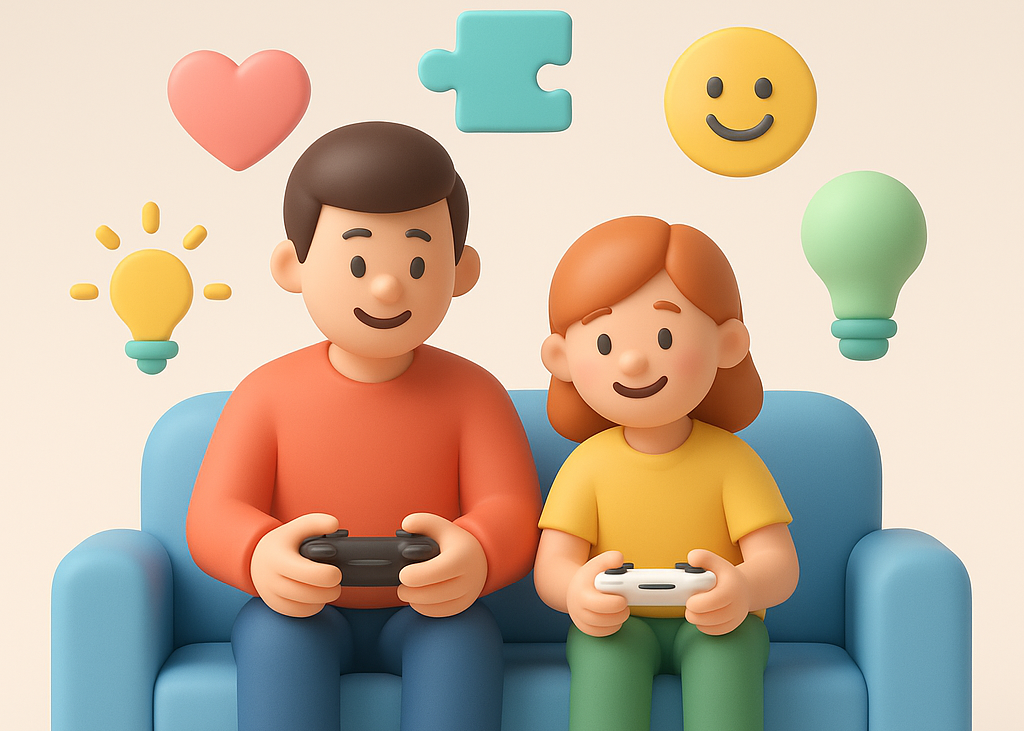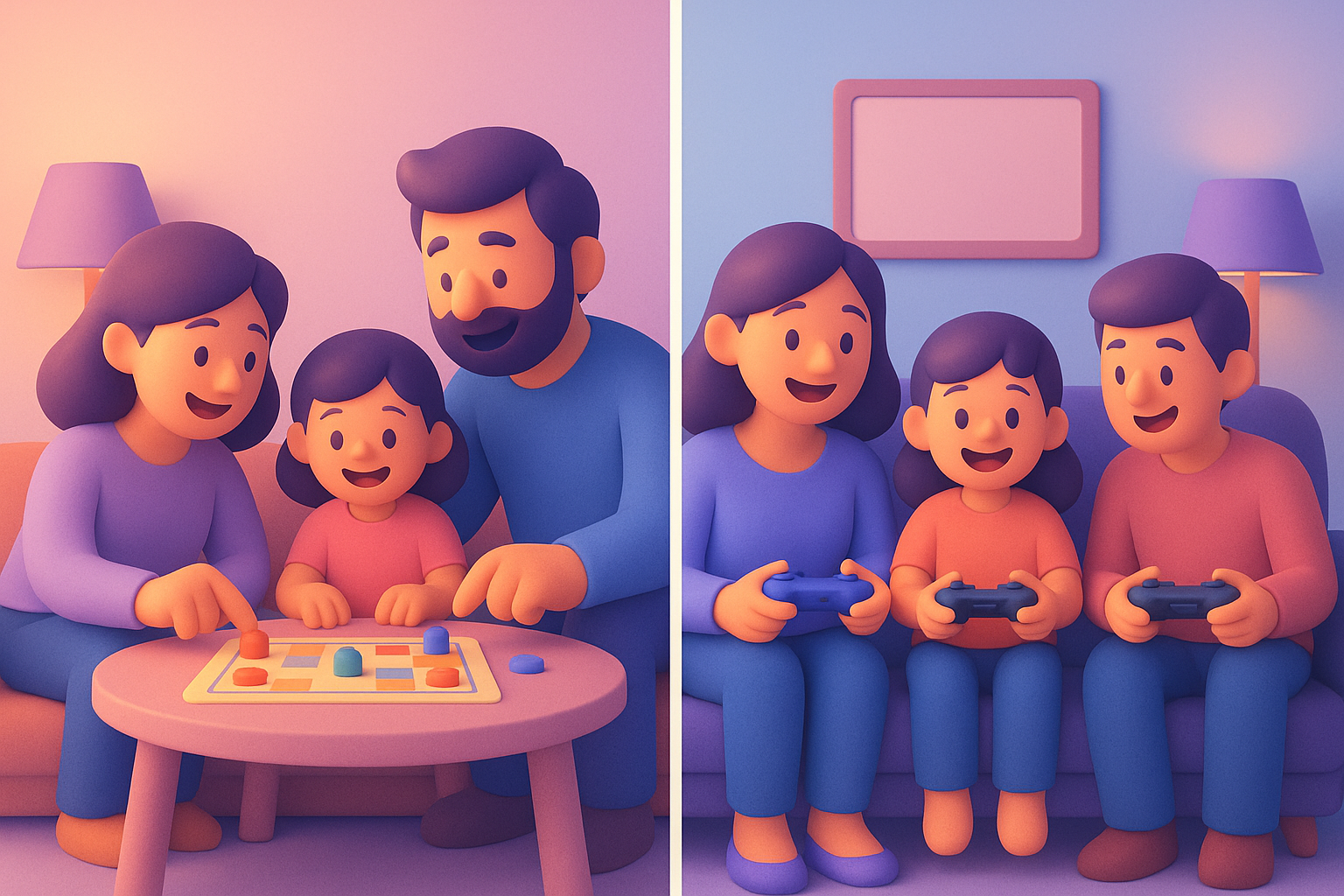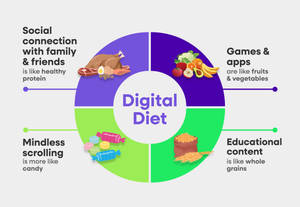Playing video games together as a family strengthens our connection and communication, reinforces essential social skills, and even helps with emotional regulation and the solidification of healthy digital habits. It also gives us a chance to model and develop digital literacy.
Co-play, or playing video games together, is one of the easiest and most fun ways to engage in our kids’ interests, get down “on their level,” and experience a range of emotions side-by-side. The key here is actively interacting — just being in the same room while the kids play is not the same. Attention and collaboration don’t happen when we’re scrolling on our phones, reading a book, or simply supervising the gameplay.
It’s when you pick up the controller, too, that the magic begins.
Nurture is a kids’ app that develops Life Readiness skills such as creativity, curiosity, and critical thinking. All the more important in the age of AI, they're developed through fun, interactive, story-driven adventures. Nurture Academy — that’s where you are right now! — is for parents learning what it takes to raise smart, happy, and resilient kids in our increasingly digital world. We’re glad you’re here!
Read on, then discover how Nurture works or get the app.
A great way to think about the benefits of playing video games with family comes from The Power of Showing Up: How Parental Presence Shapes Who Our Kids Become and How Their Brains Get Wired by Dr. Daniel Siegel & Dr. Tina Payne Bryson. That seminal book explains how “secure attachment,” kids knowing they can rely on you, stems from consistently feeling:
- Safe
- Seen
- Soothed
- Secure
By joining kids in gameplay — laughing, losing, problem-solving, or celebrating together — parents are showing up in the digital spaces their kids care about. That repeated sense of connection shapes both emotional resilience and healthy brain development.
1: Co-Play Strengthens Connection and Communication
When we spend quality time together, we strengthen our family’s bonds. Shared experiences bring us together.
Video games give kids the perfect chance to take the lead, flipping the script to give them the wisdom and authority to teach their caregivers something. Not only does this give them a chance to practice leadership skills, but also the chance to see how their parents handle frustration, challenge, and failure.
Kids might rarely see us fail in authentic, understandable ways, but video games can let them see our vulnerable side and fail safely (and sometimes, embarrassingly, repeatedly!). Losing a round ourselves, or losing a level together, builds that all-important secure attachment. It gives us opportunities to share how we’re feeling, talk about our struggle, and ask for help.
Just like board games can give us new scenarios to practice communication and empathy, video games can amplify the effect and bring it into the new virtual arena.
2: Co-Play Builds Social Skills

These co-play moments also give us plenty of chances to practice social skills that come in handy in the classroom or playground. Taking turns, tolerating frustration, and being a good loser require practice. Where better to practice than in the safety and comfort of your own home, with your trusted, loving caregiver in the thick of it with you?
Cooperative games emphasize the value of communication and teamwork, while competitive games teach communication under pressure. Games that run at a quick pace add another layer, requiring parent and child to organize, coordinate, and cooperate against the clock. Managing that type of stressful situation together gives kids a chance to flex the social skills they’ll need to deploy around their peers, too.
What does it mean to be a strong, clear, and empathetic leader? Give your kids the controller for a game they’re more familiar with than you are, and you both will quickly find out. Not only will they need to understand the different perspectives they take on in the game, but also yours — and that of any siblings that also join the fun.
3: Co-Play Builds Emotional Regulation Skills
When we play games together, we’re learning about rules and rewards as much as we are about ourselves and each other. Video games give kids a safe space to practice emotional regulation in real time, surrounded by the people who love them most. It’s where frustration, disappointment, and excitement all show up, sometimes in the same 30-second stretch. Kids get to experiment with how to manage those feelings in a safe social space.
Co-play makes this practice visible. If a child throws the controller in frustration, they’ll quickly see how that behavior affects others. It’s an immediate, built-in feedback loop, and one that’s far more effective than a lecture about “using our words.” In these shared moments, kids begin to recognize their emotions, recover from them, and understand that they can still stay connected even when things don’t go their way.
For parents, these moments are powerful too. When we lose a round, miss a jump, or even laugh at our own mistakes, we’re modeling calm, resilience, and self-control. Being a good loser (especially when you’re losing to your child) is its own form of emotional growth. It shows that big feelings can be felt, expressed, and then moved through together.
Co-play also helps families understand the limits of screen time fun. We learn together when to take a break, to step away and let our frustration settle, and understand when we’re ready to dive back in with a refreshed outlook. Modeling, not telling, can be the best way to impart these lessons.
4: Co-Play Encourages Learning and Problem-Solving
Every game, no matter how simple or silly it looks, comes with its own set of challenges to solve. Whether it’s figuring out how to defeat a boss, build a shelter, or finish a level before the timer runs out, kids are constantly learning how to analyze, adapt, and try again. Even games that don’t look like puzzles — take Fortnite, for example — are full of strategic decisions that strengthen reasoning, persistence, and systems thinking.

Parents often don’t realize that what kids are developing in those moments is adaptability, or what researchers call cognitive flexibility. That ability to shift perspective, adjust an approach, and find new solutions is one of the most valuable problem-solving skills we can nurture in early childhood.
Co-play adds another layer to this learning: when we strategize, talk through decisions, and experiment together, we make that thinking process visible. Kids see that learning is active, iterative, and sometimes messy. And that’s exactly the point.
One study even showed how this is available all the way on up to the graduate level. It found that students who played video games showed significant improvements in communication, adaptability, and resourcefulness compared to peers who didn’t play.
Through co-play, families can start fostering those same skills early. When a game doesn’t go as planned, kids learn to pause, rethink, and try a new strategy. Parents get to model that same flexibility.
Together, you’re getting better at the game, but more importantly, you’re learning how to approach challenges with creativity, persistence, and a little less fear of failure. Long after setting the controllers down, those lessons in critical thinking and problem-solving live on.
5: Co-Play Promotes Digital Literacy and Healthy Digital Habits
This fifth benefit gets a little meta — it’s about the habits and awareness we build around the digital platforms and experiences themselves. When we co-play, we’re modeling how to navigate the digital world thoughtfully and responsibly.
Digital literacy starts right here: in these small, shared moments of curiosity and decision-making.
It also gives parents a front-row seat to their kids’ current levels of digital, platform, and media literacy. How aware and intentional are kids in what they’re doing, who/what they engage with, and what they see on the screen?
Together, you can talk about how to choose games by age rating, why some titles might be too intense, and what to do when something feels off or uncomfortable online. It’s also a chance to explain why we don’t buy every skin or loot box, and how to make smart decisions about spending and safety. Sitting beside them while they explore a game, or helping them navigate an online store or settings menu, shows them how to approach technology with curiosity and caution at the same time.
We’re also laying a foundation of using screens as tools, not treats or threats. Co-play helps kids learn how to use digital media for connection, creativity, and learning as much as they do for relaxation and entertainment. That extends to the boundaries we set around screens, too. How are they part of a routine, or a reward, or a restriction?
Co-play and conversation build confidence, not dependence. It breaks down any sense of isolation or distraction, instead reminding kids that digital play is a great way to understand each other and the world around them.
All these benefits of co-playing are inspiring, aren’t they? Let’s get to the fun, then — joining your kids in their video game fun and making memories (and developmental gains) as a family.
Embracing the Fun and Value of Digital Play as a Family
Even if you do initially “show up” and game with your kids as a way of checking in on what they’re doing in their digital worlds, you are still showing up and co-playing. Chances are, you’ll enjoy it and want to keep the fun going long after you feel familiar with this aspect of their interests.
Co-play is more than just a win-win scenario, it’s a no-lose scenario (even if you lose the game, mind you). You’re connecting, supervising, communicating, and learning about each other. Don’t even think of it as purely a digital parenting initiative, but just a modern evolution of family game night and shared family experiences.
What parent or caregiver doesn’t want more quality time with their kids? Co-play is one of the best ways to break down those roles we fall into as adults and children, get on the same level, and make memories while supporting one another’s development and growth.
Just give it a go — you’ll be surprised how much you enjoy it.
FAQs: The Benefits of Family Video Gaming
How much time should families spend playing video games together?
There’s no universal number, just a universal truth that time spent together is always worth it. Think about it as you would a family board game night: it depends on your family’s routines and the child’s age. A balanced approach (short, shared sessions mixed with other play) keeps gaming positive and prevents overstimulation.
Don’t worry about finishing up a level too quickly, or about displacing other engagements. Just make some time to do something fun and playful together.
Can video games really teach life skills like empathy or problem-solving?
Yes — especially when parents play too. Games that require cooperation, perspective-taking, or shared decision-making can help kids build these skills, and co-play gives you a chance to reinforce them through conversation.
Every game presents opportunities to think critically, make choices, and respond to others. These are all ingredients for empathy and problem-solving. In Goat Simulator, for example, our family loves figuring out where hidden achievements are, and it naturally sparks collaboration and communication. Or when siblings play and one wins while the other feels disappointed, that’s empathy in real time without it feeling like a “lesson.”






 Copy Link
Copy Link
 Share
to X
Share
to X
 Share
to Facebook
Share
to Facebook
 Share
to LinkedIn
Share
to LinkedIn
 Share
on Email
Share
on Email




